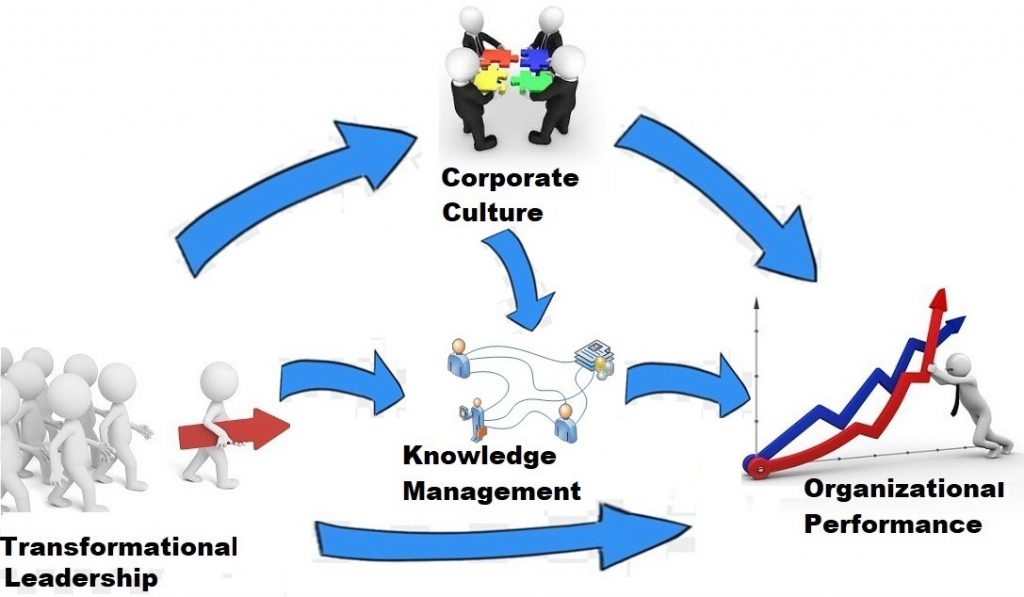This article introduces a new and dynamic perspective of transformational leadership within organizations. Transformational leaders enable corporate culture, knowledge management, and organizational performance. Without a grasp on these three tenets, executives are bound to fail.
How Transformational Leaders Influence Organizational Performance
One tool executives can use when looking to narrow the gaps between success and possible failure is to use transformational leadership and become a social architect. Executives can contribute to organizational performance through developing relationships with subordinates that link followers’ individual interests to the organization’s collective interests. Transformational leadership focuses on developing relationships to create valuable resources for companies.
Transformational leaders increase organizational performance and help close the gap between success and possible failure. Transformational leadership is a leadership style that aggregates human capital into social capital and develops organizational communications aimed at providing valuable resources for all organizational members. Thus, transformational leaders apply intellectual stimulation to enhance knowledge sharing among human capital and stipulate knowledge to be shared around the organization. Sharing the best practices and experiences could positively impact some non-financial aspects of firm performance such as innovation, providing learning and growth opportunities for employees. Empowered employees can enable an organization to actively respond to environmental changes and collective-interests.
The key to take into consideration individual consideration is to identify employee’s needs and show concern for both organizational needs and follower’s interests concurrently. When transformational leaders show concern for the employee’s individual needs, individuals begin to contribute more commitment and they become more inspired them to put extra effort into their work. This extra effort improves the quality of products, customer satisfaction, and impacts the return on assets, sales, shareholder value, and improves operational risk management.
Transformational leadership style highlights the vital importance of employee’s attitudes in accomplishing commercial objectives. For example, inspirational motivation can inspire human capital through setting highly desired expectations. The higher level of follower expectation enhances productivity and perhaps decreases organizational costs. Executives agree that the transformational leadership enhances financial and non-financial performance. Transformational leaders positively affect financial and non-financial performance through improving the price of stock, decreasing costs, increasing sales, improving innovation, increasing the rate of responses to environmental changes, improving the quality of products and services, along with a stronger customer focus and developing learning opportunities for followers. Thus, transformational leadership is positively associated with financial and non-financial performance. Executives can now see how transformational leadership can directly support performance through enabling organizational processes within companies. Therefore, I suggest that executives embrace transformational leadership. This leadership style influences some of the spans of control of the executive responsibility.
Putting Knowledge to Work
Executives are using transformational leadership which plays a critical role in developing interactions and relationships. One way is by aggregating human capital into social capital and implementing more effective changes at all levels of the organizational. Executive serve as an ideal vehicle to develop social networks, thereby providing further opportunities for employees to explore new ideas and knowledge. Important milestones in corporate culture could include inspirational motivation and intellectual stimulation, which inspire followers to take risk-related efforts and generate more innovative solutions. The key is to facilitate the knowledge acquisition process through employing an idealized influence aspect that is considered an essential source for developing relationships. Executives have acknowledged some form of relationship between transformational leaders and knowledge creation processes. Thus, the transformational form of leadership is a necessary precursor to create new knowledge and ideas within organizations. Executives are also very involved in facilitating the knowledge acquisition process. Transformational leadership positively impacts the knowledge accumulation process by promoting knowledge creation and acquisition.
Executives are finding that intellectual stimulation improves knowledge integration which enhances the knowledge sharing process. A significant contribution to knowledge integration through implementing idealized influence aimed at enhancing relationships within organizations has been known to increase profitable. For instance, transformational leadership could build a climate inspiring followers to share their knowledge, and facilitate the knowledge sharing process. Therefore, transformational leadership for integrating knowledge by enabling companies in exerting the knowledge sharing process throughout the organization.
Moreover, executives are clearly the right focal point for developing networking with environmental components by adopting the idealized influence aspect in developing relationships and interactions. They key here is to inspire their organizations as a whole to develop networking with more effective enterprises through employing inspirational motivation directed at setting highly desired expectations for followers. Thus, it is apparent that transformational leaders provide a significant contribution to knowledge reconfiguration by facilitating the activities associated with networking. Therefore, when executives adopt transformational leadership, they can then successfully put knowledge to work.
Knowledge-Driven Organizational Performance
Executives today realize that knowledge is the one of most strategic factors for organizations from a competitive standpoint. The question lies in how to maintain it, store it, retrieve it, and protect it. This has been a focal point of organizations since the corporation was first initiated and will always be an ongoing issue for leaders. For example, knowledge creation and utilization are pertinent to an organization’s success. Thus, leaders create new ideas and knowledge for innovation and to motivate employees to solve their current problems in a more innovative manner. The acquisition of new knowledge is an ongoing process and can be essential to identify the needs of customers and recognize changes in the business environment.
The accumulated knowledge is also shared and synthesized with an aim to providing higher quality products and services. This can improve financial and non-financial performance in various metrics such as the customer focus, the quality of products and services, and the organizational revenue. Shared knowledge can contribute to the development of a learning organization in which people continuously grow and develop both personally and professionally.
Finally, the integrated knowledge is reconfigured to meet new challenges and environmental changes as they occur. Therefore, knowledge reconfiguration enables organizations to actively respond to environmental changes through developing interactions and awareness from the external environment. Knowledge is a significant indicator for improving organizational performance. Knowledge management processes can improve financial and non-financial performance through increased sales, customer satisfaction, learning opportunities, innovation, and the quality of products and services. Ergo, knowledge management has a positive relationship with organizational performance.
Designing a Powerful Corporate Culture to Improve Knowledge Management and Organizational Performance
Transformational leaders have been posited to impact an organization’s culture. These types of leaders manifest themselves as change agents who manipulate corporate culture with the aim of improving knowledge management and organizational performance.
Corporate culture includes three dimensions:
- collaboration
- trust, and
- learning
Transformational leaders facilitate collaboration by using the idealized influence dimension which develops relationships in organizations. A transformational leader contributes to the cultural aspect of trust, through considering both employee’s individual interests and company’s essential needs. Also, transformational leaders identify individual needs of their employees and develop a learning culture by intellectually stimulating them to generate new knowledge and share it with others. Transformational leaders can highly manipulate a firm’s culture to conform to the needs and expectations of strategic goals and objectives.
These three cultural aspects play a critical role in enhancing the effectiveness of organizational knowledge cycles. Collaboration provides a shared understanding about the current issues and problems among employees, which helps to generate new ideas within organizations. Trust towards their leader’s decisions is a necessary precursor to create new knowledge. Moreover, the amount of time spent learning is positively related with the amount of knowledge gained, shared, and implemented. Therefore, transformational leaders can reshape, and in some cases, manipulate organizational culture to create a more effective knowledge cycle within departmental and business units of organizations.
In addition, both cultural aspects of collaboration and trust positively contribute to companies to effectively and actively respond to environmental changes and customer needs and employee growth needs through developing effective learning workplaces within these companies. This also helps companies to improve performance in terms of the quality of products and services. Learning culture as another cultural aspect sheds light on organizational capabilities to develop learning. It is quite understandable that this cultural aspect can particularly firm facilitate performance, by developing suitable workplaces for experts to effectively share their knowledge with others. People in fact recognize how old resources can address new and problematic situations by sharing their knowledge within companies, and this can help to create more innovative ideas for organizational problems. David Maister in his book, “Managing the Professional Service Firm,” says that innovative ideas generation can improve profitability for companies. Therefore, leaders can reshape, and in some cases, manipulate organizational culture to effectively manage organizational knowledge and improve firm performance.
The following figure provides a snapshot of how corporate culture mediates the relationship between transformational leadership, knowledge management and organizational performance.

In Conclusion
When change becomes increasingly valuable, transformational leadership manifests as a catalyst to implement effective changes and leverage positive effects on corporate culture. Beyond illustrating that transformational leaders manifest themselves as change agents within organizations, the nature of the interactions between transformational leadership and knowledge management can also suggest several complementary insights for the existing literature. However, the focus of this article is based upon the critical role of transformational leadership which allows a rich basis to understanding the mechanisms by which knowledge management and operations risk is influenced. Scholar’s repeatedly uncovered transformational leadership’s direct impacts on knowledge management and organizational performance. This article articulates a different approach. I simply extended the academic literature by showing how executives can also contribute to knowledge management and organizational performance by fostering an effective corporate culture. This organizational factor coupled with transformational leadership and knowledge management is presented as a new approach for executive implementation.






